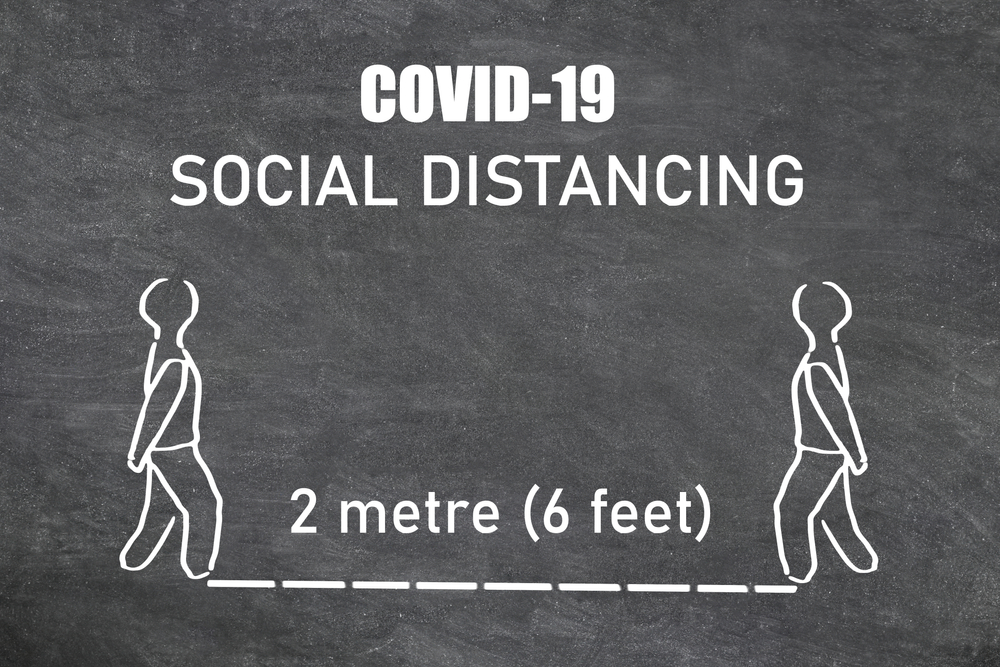
COVID 19 is a contagious respiratory-related disease caused by a virus known as coronavirus. It is spread when an uninfected person touches or inhales aerosols of cough or sneeze from an infected person. When an infected person sneezes or coughs and leaves those droplets on a surface then an uninfected person touches the same surface, they may be infected too.
The Virus attaches itself on the surface of the respiratory organs as well as the lungs, hence affecting breathing. A severely affected patient of COVID 19 breathes through the aid of a device known as a ventilator. The disease has killed hundreds of thousands of people throughout the world and has no cure or a vaccine yet. The only option left for the uninfected people is to protect themselves to avoid contracting the virus. This is achieved through thorough washing of hands with soap under running water, sanitizing, wearing face masks and maintaining social distance. This article gives more information regarding social distancing and its benefits in preventing COVID-19.
What is Social Distancing?
This is the distance kept between one person and another when in public. The recommended distance is 6ft or 2m. Since maintaining this distance is hard, especially in public facilities, people are advised to stay and work from home to achieve this distance.
Benefits of Social Distancing
- Slows the Spread of COVID-19
Since the virus that causes COVID 19 is spread by droplets from a sneeze or cough of an infected person, maintaining social distancing helps slow the spread of the disease. It also reduces the chances of an uninfected person touching surfaces with droplets that contain coronavirus. If for example, a 100 people were converged in one place and one of them happens to be infected, they would all be infected with COVID 19. They would then disperse and each of them would go infecting other people and the chain continues. Eventually, we would have a world full of sick people.
- Protects Uninfected Persons
Maintaining social distance helps protect the most vulnerable people in the society from being infected with COVID 19. The most vulnerable group of people include the elderly, those already suffering from respiratory-related conditions like asthma and tuberculosis, diabetes patients, people with compromised immune system as well as babies. As we all know, people with a weak immune are susceptible to all sorts of infections such as common colds among other infectious diseases. Babies have a weak immune that has not fully developed to fight strong infections like common colds leave alone COVID 19. Old people, on the other hand, have a weak immune since their bodies can no longer produce enough antibodies to fight infections. It is evident from the statistics and daily briefings that the majority of deaths from COVID 19 in Italy are the elderly. This is why health departments all over the world are urging people to stay home to avoid bringing back the virus to the most vulnerable people amongst our societies.
- It Gives Healthcare Workers Time to Prepare
Social distancing helps reduce the rate of infections for COVID-19, hence decongesting our healthcare facilities. So many patients would only overwork the healthcare workers and cause more deaths since there can never be enough staff for everyone. Reduced rates of infection means that healthcare workers have enough time to prepare for a moderate number of COVID-19 patients. The smaller the rate of infections, the less overworked the staff is and able to tend fully tend to the infected people, hence more recoveries.
- Helps Decongest Isolation Wards
Failure to maintain social distancing only leads to an increase in the infection rate. The ripple effect of this is that isolation wards are crowded. Since no country in the world has enough ventilators to help a large number of COVID 19 patients, healthcare systems would be overwhelmed, making the situation worse that it is.
In a bid to help maintain social distancing, employers and the government has demanded people to work from home and avoid unnecessary movement. Some regions and countries have been put under total lockdown. People only move out when they need to buy essential supplies like food and medication. Most food and drug companies have now joined in the fight against the pandemic. They are now delivering food and drugs to peoples’ doorsteps to discourage them from moving around. That being said, you should help sensitize the need for keeping social distancing to flatten the infection rate curve. Therefore, unless you have very important things to do, consider staying at home, and if you go out, be sure to maintain the recommended distance.
